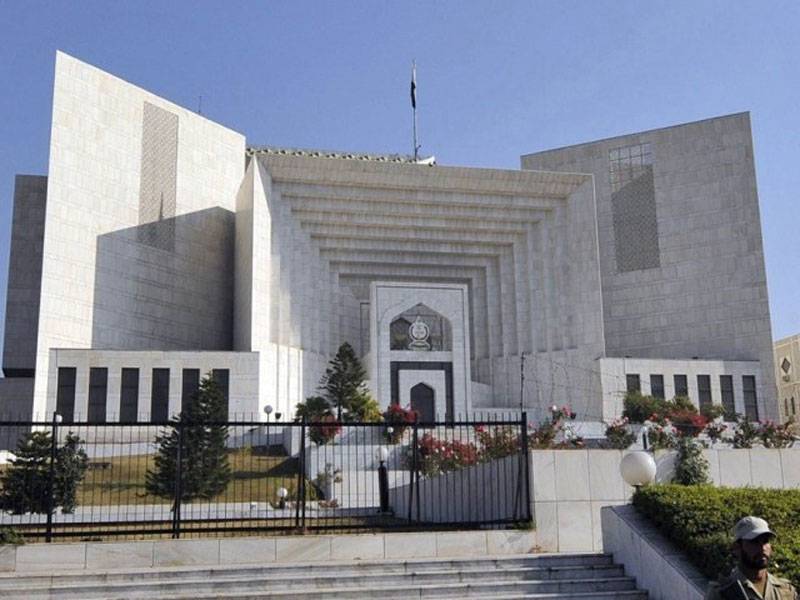ISLAMABAD - The Supreme Court Saturday issued detailed judgment in the case pertaining to petitions seeking apex court order to annul 2013 general elections, reiterating that the court has no constitutional mandate to validate or annul elections though it was entitled to hear appeals against decisions of election tribunals.
A three-member bench headed by Chief Justice Nasirul Mulk and including Justice Amir Hani Muslim and Justice Ijaz Ahmed Chaudhry on October 29, 2014 had dismissed the petitions, filed by Justice (r) Shahid Akhtar Mehmood Siddqui and Zahid Sarfraz, ex-parliamentarian and a lawyer of Lahore High Court.
They had filed the petitions under Article 184(3) of the constitution with the prayers to declare the May 2013 election void due to massive rigging, both pre and post polls, besides seeking criminal and department action against all those responsible.
The judgment authored by the chief justice noted that the petitioners' counsels failed to give the satisfactory reply to the court query whether in view of the Article 225 of constitution there was any way to decide the election petitions other than by the Election Tribunal and whether the results of the entire general elections for the national and provincial assemblies could be annulled under any provision of the constitution or law.
The judgment noted that the petitioners neither impleaded MNAs and MPAs nor members of the Election Commission of Pakistan (ECP), against whom the petitioners sought criminal and department action. The court referred several judgments of the Pakistani courts saying all the parties should be impleaded in the case which are effected somehow.
"...thus non-impleadment of necessary parties, who are likely to be affected, would deprive them of appearing before the court and contesting the petitions at the preliminary stage... Without impleadment of the said necessary parties these petitions are not maintainable," the judgment noted.
The court also noted that none of the petitioners filed any document even to lay a foundation for issuance of notice to the federation, ECP, National Database and Registration Authority (Nadra) and Pakistan Council of Scientific and Industrial Research (PCSIR).
"This deficiency too precluded the court from proceeding further with these petitions," said the detailed judgment of the Supreme Court. "Since we are not provided with any assistance on the propositions we refrain from dilating upon them, [therefore] ... the petitions are dismissed," the judgment concluded.
The court observed that the prayers made in the petition were incapable of enforcement on account of their vagueness. The petitioner sought directions for appropriate authorities to initiate criminal and department action against members of the ECP. In the absence of the mentioning specific authorities no direction can be given.
The court said it didn't have jurisdiction to hear the petitions as questions raised in them pertain to factual inquiry. Regarding allowing political protests, the court noted that no averment has been made that any authority has restrained any political party from staging protest demonstrations.
Legal experts are of the view that the court decision has shut the door for frivolous petitions against the general elections, as under Article 225 of the constitution the Supreme Court has no mandate to investigate the rigging charges, but can only hear the appeals against the election tribunals’ verdicts.
The petitioners had prayed to the court to declare the results of entire general elections held in the year 2013 null and void. The common allegation in all the three petitions related to the use of substandard ink instead of indelible ink during the polls for putting thumb impressions by voters on the counter files of the ballot papers.
Petitioner Shahid Siddiqui confined his request for enquiry to pre-polls process. He stated that the ECP willingly, deliberately and without hideous intentions, did not perform its duties with the terms of mandatory statutes.
The former judge and other petitioners had prayed that the appropriate authorities be directed to initiate criminal as well as departmental action against the members of the ECP and those officers of the ECP, who had negotiated the and purchased defective ink from the PCSIR laboratories and Nadra and supplied it to the Returning Officers/Presiding Officers for use at polling stations.
The court had said in its short order that declaring the general election null and void in entirety would result in the unseating of all the members of the national and provincial assemblies, who had not been impleaded in the petitions.
Saturday, April 20, 2024
SC seals door to frivolous pleas against polls

Freedom Flotilla prepares for humanitarian aid delivery to Gaza
9:14 AM | April 20, 2024
22 suspects arrested
April 20, 2024
Policitising Tragedy
April 20, 2024
Tehran to Rafah
April 20, 2024
A New Leaf
April 20, 2024
A Tense Neighbourhood
April 19, 2024
Dubai Underwater
April 19, 2024
Dangers of Deepfakes
April 20, 2024
Feudalism
April 20, 2024
Kite tragedy
April 19, 2024
Discipline dilemma
April 19, 2024
Urgent plea
April 19, 2024
ePaper - Nawaiwaqt
Advertisement
Nawaiwaqt Group | Copyright © 2024





